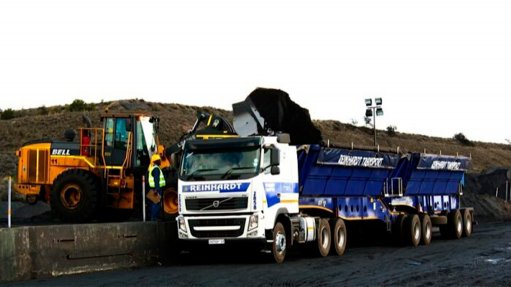
JSE-listed investment holding company Labat Africa has concluded a R560-million subscription and buy-back agreement for the acquisition of a 100% interest in Reinhardt Transport Group (RTG) and its Chrome Carriers subsidiary.
The acquisition, which would see empowered firm Labat acquire all RTG’s assets, including a fleet of 580 trucks and seven premises, better positioned the company as a logistics company providing transport infrastructure related services with operations in South Africa and across sub-Saharan Africa.
As part of the deal, Labat had also elected to terminate RTG’s five-year, $100-million equity funding facility with US-based Global Emerging Market (GEM).
Labat CEO Brian van Rooyen told Engineering News Online that the company was “hellbent” on increasing profitability to R126-million next year.
In addition to its planned acquisition of a 100% interest in RTG Logistica for R500 000 during 2016, Van Rooyen revealed that Labat also had three other acquisitions in the pipeline that would expand the company’s base to other sectors, including a logistics business within the fuel sector.
“RTG had a specific market, but we will work on that,” he said, adding that Labat was particularly focusing on securing coal trucking contracts from State-owned Eskom.
In earlier years, RTG had had some coal trucking contracts, but owing to its lack of empowerment, it had lost those contracts.
Van Rooyen explained that the biggest shortcoming RTG had was its black economic-empowerment (BEE) levels. “Not only did some of the customers require black ownership, it also required black-women ownership, so any drawdown from GEM would have meant that black shareholding would have to be replaced with foreign shareholding,” he said.
Van Rooyen further noted that every drawdown from GEM would also mean that the company would need to issue equity.
Labat currently had a Level 1 BEE rating, but expected the RTG transaction to improve the rating to Level 2. RTG would now be a Level 4 BEE company, with 67% black ownership.
Noting that the transaction would not need any external funding, Van Rooyen said it was being financed through a combination of debt and equity arrangements, but that the company also had other options, with a number of funds available.
Labat had secured R230-million in deferred funding from an RTG vendor, which would be used to settle a portion of the consideration, while the R330-million balance would be settled in cash by issuing up to 220-million new Labat shares at 150c apiece, of which R129-million would be subscribed for by the RTG vendors, including RTG management and the balance of R201-million would be settled through a private share placement.
The private placement was being preferentially offered to BEE retail investors as Labat wished to retain a strong and acceptable BEE rating post the transactions.
The total number of shares in issue in Labat post the acquisition and issue of shares for cash would be 509.2-million shares. A proposal would then be made to the JSE for the listing of Labat to be transferred to the main board.
This week, Labat also renewed a three-year contract, with an option to renew, with an unnamed “substantial client”.
INTO AFRICA
One of the depots that Labat would acquire through the RTG transaction was located in Maputo, Mozambique, from where RTG Group exported chrome, magnetite and other mining commodities from the region.
Van Rooyen noted that, although this would be Labat’s first depot outside South Africa, it would certainly not be its last, noting that the company had planned a diversification strategy to expand further into the continent.
“First, we will take the South African portfolio and expand on that, before we venture into the rest of the African market,” he said.
Labat had also, for the past three months, been engaged in a pilot project to transport goods to and from Zimbabwe. “Our strategy is to look at [the region’s] corridors, but we are not going to venture into markets that we don’t know too well.”